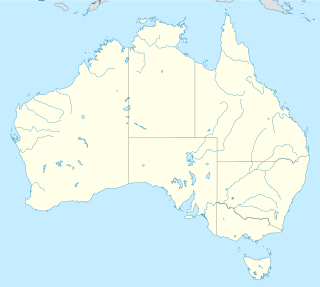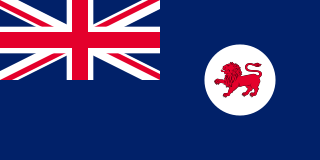The Australian Broadcasting Corporation (ABC) is Australia's national broadcaster. It is principally funded by the direct grants from the Australian Government, and is administered by a board appointed by the government of the day. The ABC plays a leading role in journalistic independence, and is fundamental in the history of broadcasting in Australia.

New South Wales is a state on the east coast of Australia. It borders Queensland to the north, Victoria to the south, and South Australia to the west. Its coast borders the Coral and Tasman Seas to the east. The Australian Capital Territory is an enclave within the state. New South Wales' state capital is Sydney, which is also Australia's most populous city. In June 2020, the population of New South Wales was over 8.1 million, making it Australia's most populous state. Just under two-thirds of the state's population, 5.3 million, live in the Greater Sydney area. The demonym for inhabitants of New South Wales is New South Welshmen.

Oceania is a geographic region that includes Australasia, Melanesia, Micronesia and Polynesia. Spanning the Eastern and Western Hemispheres, Oceania has a land area of 8,525,989 square kilometres (3,291,903 sq mi) and a population of over 41 million. When compared to continents, the region of Oceania is the smallest in land area and the second smallest in population after Antarctica.

Perth is the capital and largest city of the Australian state of Western Australia (WA). It is Australia's fourth-most populous city, with a population of 2.1 million living in Greater Perth in 2018. Perth is part of the South West Land Division of Western Australia, with most of the metropolitan area on the Swan Coastal Plain between the Indian Ocean and the Darling Scarp. The city has expanded outward from the original British settlements on the Swan River, upon which the city's central business district and port of Fremantle are situated. Perth city is located on land on which the Whadjuk Nyoongar, the Aboriginal people of the south west of Western Australia, have lived for at least 38,000 years.

Russell Ira Crowe is an actor, film producer, director and musician. Although a New Zealand citizen, he has lived most of his life in Australia since 1985. He came to international attention for his role as the Roman General Maximus Decimus Meridius in the epic historical film Gladiator (2000), directed by Ridley Scott, for which Crowe won an Academy Award, a Broadcast Film Critics Association Award, an Empire Award, and a London Film Critics Circle Award for Best Leading Actor, along with ten other nominations in the same category. Crowe's other award-winning performances include portrayals of tobacco firm whistle-blower Jeffrey Wigand in the drama film The Insider (1999) and John F. Nash in the biopic A Beautiful Mind (2001).

Sydney is the capital city of the state of New South Wales, and the most populous city in Australia and Oceania. Located on Australia's east coast, the metropolis surrounds Port Jackson and extends about 70 km (43.5 mi) on its periphery towards the Blue Mountains to the west, Hawkesbury to the north, the Royal National Park to the south and Macarthur to the south-west. Sydney is made up of 658 suburbs, spread across 33 local government areas. Informally there are at least 15 regions. Residents of the city are known as "Sydneysiders". As of June 2020, Sydney's estimated metropolitan population was 5,367,206, meaning the city is home to approximately 66% of the state's population.

Tasmania is an island state of Australia. It is located 240 km (150 mi) to the south of the Australian mainland, separated by Bass Strait. The state encompasses the main island of Tasmania, the 26th-largest island in the world, and the surrounding 334 islands. The state has a population of about 541,000 people as of September 2020. The state capital and largest city is Hobart, with around 40 percent of the population living in the Greater Hobart area.

Western Australia is a state occupying the western 32.9 percent of the land area of Australia excluding external territories. It is bounded by the Indian Ocean to the north and west, and the Southern Ocean to the south, the Northern Territory to the north-east, and South Australia to the south-east. Western Australia is Australia's largest state, with a total land area of 2,527,013 square kilometres (975,685 sq mi), and the second-largest country subdivision in the world, surpassed only by Russia's Sakha Republic. As of 2017, the state has about 2.6 million inhabitants – around 11 percent of the national total – of whom the vast majority live in the south-west corner; 79 percent of the population lives in the Perth area, leaving the remainder of the state sparsely populated.

Anzac Day is a national day of remembrance in Australia and New Zealand that broadly commemorates all Australians and New Zealanders "who served and died in all wars, conflicts, and peacekeeping operations" and "the contribution and suffering of all those who have served". Observed on 25 April each year, Anzac Day was originally devised to honour the members of the Australian and New Zealand Army Corps (ANZAC) who served in the Gallipoli Campaign, their first engagement in the First World War (1914–1918).

Canberra is the capital city of Australia. Founded following the federation of the colonies of Australia as the seat of government for the new nation, it is Australia's largest inland city and the eighth-largest city overall. Unusual among Australian cities, it is an entirely planned city. The city is located at the northern end of the Australian Capital Territory at the northern tip of the Australian Alps, the country's highest mountain range. As of June 2020, Canberra's estimated population was 431,380.

Queensland is a state situated in northeastern Australia, and is the second-largest and third-most populous Australian state. It is bordered by the Northern Territory, South Australia and New South Wales to the west, south-west and south respectively. To the east, Queensland is bordered by the Coral Sea and the Pacific Ocean. To its north is the Torres Strait, separating the Australian mainland from Papua New Guinea. With an area of 1,852,642 square kilometres (715,309 sq mi), Queensland is the world's sixth-largest sub-national entity, and is larger than all but 15 countries. Due to its size, Queensland's geographical features and climates are diverse, including tropical rainforests, rivers, coral reefs, mountain ranges and sandy beaches in its tropical and sub-tropical coastal regions, as well as deserts and savanna in the semi-arid and desert climatic regions of its interior.

The emu is the second-largest living bird by height, after its ratite relative, the ostrich. It is endemic to Australia where it is the largest native bird and the only extant member of the genus Dromaius. The emu's range covers most of mainland Australia, but the Tasmanian, Kangaroo Island and King Island subspecies became extinct after the European settlement of Australia in 1788.

The Order of Australia is an order of chivalry established on 14 February 1975 by Elizabeth II, Queen of Australia, on the recommendation of the Australian government, to recognise Australian citizens and other persons for achievement or meritorious service. Before the establishment of the order, Australian citizens received British honours.

The Gallipoli campaign was a military campaign in the First World War that took place on the Gallipoli peninsula, from 17 February 1915 to 9 January 1916. The Entente powers, Britain, France and Russia, sought to weaken the Ottoman Empire, one of the Central Powers, by taking control of the Turkish straits. This would expose the Ottoman capital at Constantinople to bombardment by Allied battleships and cut it off from the Asian part of the empire. With Turkey defeated, the Suez canal would be safe, and a year-round Allied supply route could be opened through the Black Sea to warm water ports in Russia.

Aboriginal Australians are the various Indigenous peoples of the Australian mainland and many of its islands, such as Tasmania, Fraser Island, Hinchinbrook Island, the Tiwi Islands, and Groote Eylandt, but excluding the Torres Strait Islands. The term Indigenous Australians refers to Aboriginal Australians and Torres Strait Islanders collectively. It is generally used when both groups are included in the topic being addressed. Torres Strait Islanders are ethnically and culturally distinct, despite extensive cultural exchange with some of the Aboriginal groups. The Torres Strait Islands are mostly part of Queensland but have a separate governmental status.

The States and Territories of Australia are the regional governments in Australia, distinct from the federal government and local governments. States are self-administered regions with their own constitutions, legislature, police force, departments, and certain civil authorities, that administer and deliver most public policies and programs. Territories administer local policies and programs much like states, but are constitutionally and financially subordinate to the federal government.

Australia, officially the Commonwealth of Australia, is a sovereign country comprising the mainland of the Australian continent, the island of Tasmania, and numerous smaller islands. It is the largest country in Oceania and the world's sixth-largest country by total area. Its population of nearly 26 million is highly urbanised and heavily concentrated on the eastern seaboard. Australia's capital is Canberra, and its largest city is Sydney. The country's other major metropolitan areas are Melbourne, Brisbane, Perth, and Adelaide.

Stephen Robert Irwin, nicknamed "The Crocodile Hunter", was an Australian zookeeper, television personality, wildlife expert, environmentalist, and conservationist.
Indigenous Australians are people with familial heritage to groups that lived in Australia before British colonisation. They include the Aboriginal and Torres Strait Islander peoples of Australia. The term Aboriginal and Torres Strait Islander peoples or the person's specific cultural group, is often preferred, though the terms First Nations of Australia, First Peoples of Australia and First Australians are also increasingly common.

Melbourne is the capital and most-populous city of the Australian state of Victoria, and the second-most populous city in Australia and Oceania. Its name refers to an urban agglomeration of 9,993 km2 (3,858 sq mi), comprising a metropolitan area with 31 municipalities, and is also a common name for its city centre. The city occupies much of the coastline of Port Phillip bay and spreads into the Hinterland towards the Dandenong and Macedon ranges, Mornington Peninsula and Yarra Valley. It has a population of 5 million, and its inhabitants are commonly referred to as "Melburnians".

















